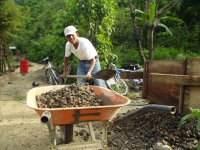 San Juan la Laguna wakes up to the sound of corn mills. I love the saying here, ‘sin maís no hay país’, which means, ‘without corn there is no country’. Even if you’re in the mountains, you still hear the corn mills from the peak.
San Juan la Laguna wakes up to the sound of corn mills. I love the saying here, ‘sin maís no hay país’, which means, ‘without corn there is no country’. Even if you’re in the mountains, you still hear the corn mills from the peak. 
Women and girls line up in the morning with their bowls of the yellow grain to get it processed into a paste that resembles butter. Then, it’s tortilla-time. All the food here is served with tortillas.
I ate in a comedor today- the cook still hadn’t arrived at my eco-hotel by 8:30 and my stomach was growling. For eight quetzals (about $1.50), I got beans, eggs, rice, a bunch of tortillas and a coffee with too much sugar. What’s great is that eight hours later, I’m feeling fine. I think my digestive system is finally going local.
Took-took, pickups and colourful buses
 Guatemala boasts a colourful palette of means of transportation. The most common is the chicken bus (so baptized by tourists because… well, the description that follows should depict it fairly enough.) The chicken bus is an old diesel-fuelled Canadian or American school bus painted in bright colours and decorated with flashing lights. The driver has a helper than hangs on to the side of the bus, shouting the destination as the bus honks a few times. The point is to squeeze in as many people as possible, so sometimes a human has to transform into a monkey and literally climb over the other passengers’ heads in order to get out. Animals have been known to travel in these buses, including chickens in bottomless cages sitting above the passengers. When nature calls… If you haven’t been on a chicken bus, you haven’t been in Guatemala.
Guatemala boasts a colourful palette of means of transportation. The most common is the chicken bus (so baptized by tourists because… well, the description that follows should depict it fairly enough.) The chicken bus is an old diesel-fuelled Canadian or American school bus painted in bright colours and decorated with flashing lights. The driver has a helper than hangs on to the side of the bus, shouting the destination as the bus honks a few times. The point is to squeeze in as many people as possible, so sometimes a human has to transform into a monkey and literally climb over the other passengers’ heads in order to get out. Animals have been known to travel in these buses, including chickens in bottomless cages sitting above the passengers. When nature calls… If you haven’t been on a chicken bus, you haven’t been in Guatemala.In the more mountainous regions, one can opt for a colectivo, which is a pick-up truck that goes from town to town. It usually costs Q1.50, a few cents. It can actually be quite fun to ride on the pick-up. If you’re lucky, they’ll cover you with plastic when it rains. If not, at least you’ll have your ride and a shower too.
Took-tooks are three-wheeled taxis. Apparently, five years ago, they didn’t exist in Guatemala. The concept was imported recently from Asia. My first took-took experience was a bit ‘sketchy’. I was in Antigua, it was already dark and rainy. I had to take a took-took to the house I was staying at, but the driver had a hard time finding the street, which was actually a dirt road. Of course, my heart started beating a bit faster as we went back and forth without finding the place. But eventually we found it. Another proof that more than 90% of the things we worry about don’t happen…
Saving the earth
 San Juan la Laguna was severely affected by hurricane Stan. This community’s main mode of subsistence is agriculture, so when heavy rain washed away its lands, its people were rather disempowered. Nevertheless, with the help of Fundación Solar, tremendous progress has been made here since the hurricane. An earth-saving program was implemented with incentives for farmers to clean up the boulders choking their lands, reforestation projects are under way with the help of tree gardens that breed the plants that will fill the lands when they are cleaned up, and vegetable gardens were created so people don’t have to depend on exterior help to eat.
San Juan la Laguna was severely affected by hurricane Stan. This community’s main mode of subsistence is agriculture, so when heavy rain washed away its lands, its people were rather disempowered. Nevertheless, with the help of Fundación Solar, tremendous progress has been made here since the hurricane. An earth-saving program was implemented with incentives for farmers to clean up the boulders choking their lands, reforestation projects are under way with the help of tree gardens that breed the plants that will fill the lands when they are cleaned up, and vegetable gardens were created so people don’t have to depend on exterior help to eat.The city is pretty clean, because the Fundación equipped it with trash cans that didn’t exist before, and because people are getting sensitized to the importance of hygiene. Traditional arts, crafts and medicine are being valued through touristic circuits which allow the visitors to tour the local artists’ associations and workshops. There are also two eco-hotels offering rooms within a very natural ambience, offering organic coffee, foods, shampoo and toilet paper… One of them has an advanced recycling program which included composting.
I see a lot of potential within this little town bordered by the magical Atitlán lake…
Faces of San Juan
I think my few days of photography lessons have paid off, and I’m much happier with the pictures that I’ve been taking since then.

